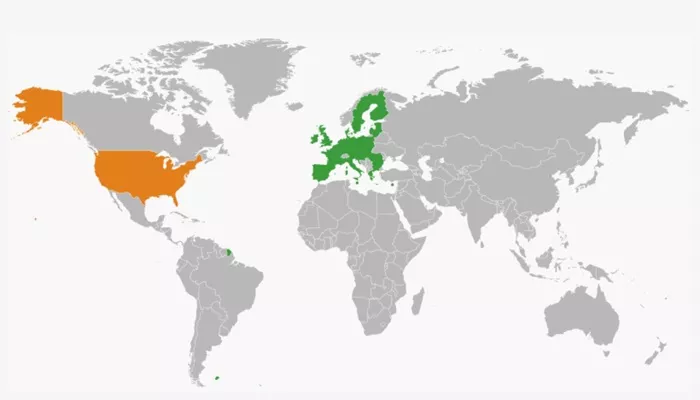On May 30th local time, a significant development emerged in the trade relations between the United States and the European Union. Commissioner Shevchovich of the European Commission, who is responsible for trade and economic security affairs, held a phone conversation with US Commerce Secretary Lutnick. During this call, Shevchovich emphasized the necessity for continued cooperation to promote forward – looking solutions and attempted to engage in communication regarding the bilateral trade negotiations.
According to US media reports, the EU has expressed its hope that the US will lift the 25% tariffs imposed on steel and automobiles. Moreover, the EU hopes that US President Trump will abandon the so – called “reciprocal tariffs.” These tariffs have been a major point of contention in the trade relationship between the two sides. Initially, the tariffs for the EU were set at 20%, but during the 90 – day suspension period before July, they remained at 10%.
Uncertainty in the Trade Environment
EU Commission Trade Commissioner Dimitar Dimitrovski made a statement on the same day, highlighting that the recent ruling by the US court on the legality of the Trump administration’s “reciprocal tariffs” has added an extra layer of uncertainty to an already complex trade environment. The current trade negotiation environment is rife with uncertainties, and the situation is evolving rapidly.
The “judicial battle” over tariffs is currently facing substantial uncertainties. The US Federal Circuit Court of Appeals approved the Trump administration’s request on May 29th local time and temporarily suspended the ruling made by the US International Trade Court earlier, which prohibited the implementation of the executive order issued by the Trump administration to impose tariffs on multiple countries. White House Press Secretary Caroline Leavitt criticized the US Court of International Trade’s ruling to “halt” several tariff executive orders issued by the Trump administration as “an abuse of judicial power” and stated that the US government has filed an emergency motion to stay the judgment during the appeal process and is taking administrative measures to ultimately overturn the ruling.
Impact on Global Enterprises
Global enterprises, including those from the United States, are bearing the brunt of the “tariff war.” According to the latest report, due to the cost increase and sales decline caused by the Trump administration’s tariff policies, the losses of major global enterprises have reached 34 billion US dollars.
Reuters obtained these figures by examining company statements, regulatory documents, meeting minutes, and media conference call records. The surveyed enterprises were from the S&P 500 index in the United States (32 companies), the Stoxx 600 index in Europe (3 companies), and the Nikkei 225 index in Japan (21 companies). Professor Jeffrey Sonnenfeld from Yale University’s School of Management suggested that the actual losses of enterprises could be several times the disclosed amount.
As the corporate earnings season draws to a close, the potential losses of global companies due to tariff policies over the past quarter have become more apparent. At least 42 companies have lowered their profit expectations, and 16 companies have withdrawn or suspended the release of their profit expectations. For example, Walmart refused to provide a quarterly profit forecast earlier this month and announced price hikes, which drew condemnation from Trump. Volvo Cars, one of the European car manufacturers most affected by US tariffs, withdrew its profit expectations for the next two years. Large multinational companies such as Apple, Ford, Porsche, and Sony all either withdrew or significantly lowered their profit expectations in their first – quarter financial reports.
EU’s Stance and Negotiating Leverage
Sefkovic said earlier this week that the European Commission is in talks with Washington regarding potential cooperation in areas such as aerospace, steel, semiconductors, and key minerals.
Another EU official said on Friday that due to the US court’s questioning of the legality of “reciprocal tariffs,” the EU has gained new leverage in its trade negotiations with the US. An EU official involved in the negotiations stated, “The legality of’reciprocal tariffs’ is uncertain, which undoubtedly gives us an additional negotiating advantage. We will continue the negotiations, and our goal remains to eliminate tariffs for each other.”
Dombrovskis reiterated that the EU is committed to reaching a negotiation agreement with the United States, given the strong relationship between the two and the fact that the EU – US trade relationship is the largest in the world, with significant economic interests at stake. He also described the tariff situation as “urgent” due to its negative economic impact on both the EU and the US.
Related topics:

